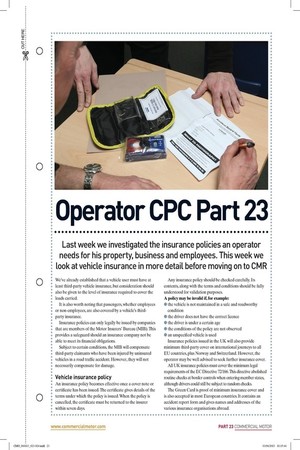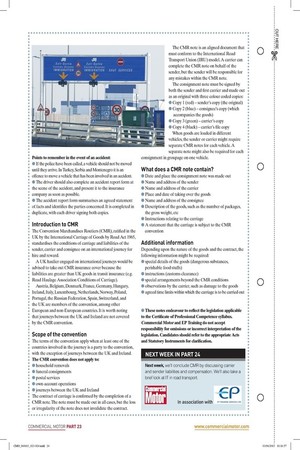Operator CPC Part 23 Last week we investigated the insurance
Page 18

Page 19

If you've noticed an error in this article please click here to report it so we can fix it.
policies an operator needs for his property, business and employees. This week we look at vehicle insurance in more detail before moving on to CMR We've already established that a vehicle user must have at least third-party vehicle insurance, but consideration should also be given to the level of insurance required to cover the loads carried.
It is also worth noting that passengers, whether employees or non-employees, are also covered by a vehicle's thirdparty insurance.
Insurance policies can only legally be issued by companies that are members of the Motor Insurers' Bureau (MIB). This provides a safeguard should an insurance company not be able to meet its financial obligations.
Subject to certain conditions, the MIB will compensate third-party claimants who have been injured by uninsured vehicles in a road traffic accident. However, they will not necessarily compensate for damage.
Vehicle insurance policy An insurance policy becomes effective once a cover note or certificate has been issued. The certificate gives details of the terms under which the policy is issued. When the policy is cancelled, the certificate must be returned to the insurer within seven days. Any insurance policy should be checked carefully. Its contents, along with the terms and conditions should be fully understood for validation purposes.
A policy may be invalid if, for example: • the vehicle is not maintained in a safe and roadworthy condition • the driver does not have the correct licence • the driver is under a certain age • the conditions of the policy are not observed • an unspecified vehicle is used Insurance policies issued in the UK will also provide minimum third-party cover on international journeys to all EU countries, plus Norway and Switzerland. However, the operator may be well advised to seek further insurance cover.
All UK insurance policies must cover the minimum legal requirements of the EC Directive 72/166. This directive abolished routine checks at border controls when entering member states, although drivers could still be subject to random checks.
The Green Card is proof of minimum insurance cover and is also accepted in most European countries. It contains an accident report form and gives names and addresses of the various insurance organisations abroad. Points to remember in the event of an accident • If the police have been called, a vehicle should not be moved until they arrive. In Turkey, Serbia and Montenegro it is an offence to move a vehicle that has been involved in an accident.
• The driver should also complete an accident report form at the scene of the accident, and present it to the insurance company as soon as possible.
• The accident report form summarises an agreed statement of facts and identifies the parties concerned. It is completed in duplicate, with each driver signing both copies.
Introduction to CMR The Convention Marchandises Routiers (CMR), ratified in the UK by the International Carriage of Goods by Road Act 1965, standardises the conditions of carriage and liabilities of the sender, carrier and consignee on an international journey for hire and reward.
A UK haulier engaged on international journeys would be advised to take out CMR insurance cover because the liabilities are greater than UK goods in transit insurance (e.g. Road Haulage Association Conditions of Carriage).
Austria, Belgium, Denmark, France, Germany, Hungary, Ireland, Italy, Luxembourg, Netherlands, Norway, Poland, Portugal, the Russian Federation, Spain, Switzerland, and the UK are members of the convention, among other European and non-European countries. It is worth noting that journeys between the UK and Ireland are not covered by the CMR convention.
Scope of the convention The terms of the convention apply when at least one of the countries involved in the journey is a party to the convention, with the exception of journeys between the UK and Ireland. The CMR convention does not apply to: • household removals • funeral consignments • postal services • own-account operations • journeys between the UK and Ireland The contract of carriage is confirmed by the completion of a CMR note. The note must be made out in all cases, but the loss or irregularity of the note does not invalidate the contract. The CMR note is an aligned document that must conform to the International Road Transport Union (IRU) model. A carrier can complete the CMR note on behalf of the sender, but the sender will be responsible for any mistakes within the CMR note.
The consignment note must be signed by both the sender and first carrier and made out as an original with three colour coded copies: • Copy 1 (red) — sender's copy (the original) • Copy 2 (blue) — consignee's copy (which accompanies the goods) • Copy 3 (green) — carrier's copy • Copy 4 (black) — carrier's file copy What does a CMR note contain?
• Date and place the consignment note was made out • Name and address of the sender • Name and address of the carrier • Place and date of taking over the goods • Name and address of the consignee • Description of the goods, such as the number of packages, the gross weight, etc • Instructions relating to the carriage • A statement that the carriage is subject to the CMR convention Additional information Depending upon the nature of the goods and the contract, the following information might be required: • special details of the goods (dangerous substances, perishable food stuffs) • instructions (customs clearance) • special arrangements beyond the CMR conditions • observations by the carrier, such as damage to the goods • agreed time limits within which the carriage is to be carried out • These notes endeavour to reflect the legislation applicable to the Certificate of Professional Competence syllabus. Commercial Motor and EP Training do not accept responsibility for omissions or incorrect interpretation of the legislation. Candidates should refer to the appropriate Acts and Statutory Instruments for clarification.










































